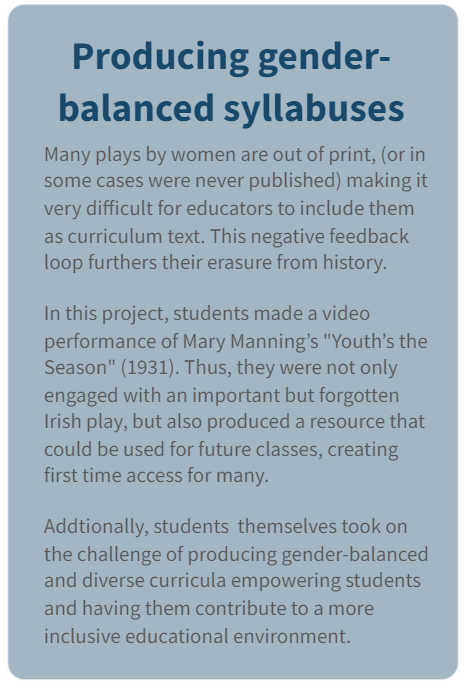Reviving the past to chart new paths
Course Summary
Students from the University of Galway, across various art disciplines, collaborated with lecturers and professional partners in the arts sector to address the under-representation of key figures in the Creative Arts (Theatre and Music) in the course. They focussed on the relationship and persisting gaps between the canon (the repertoire of “great” artists whose work is regularly performed and published) and the curriculum (the collection of key texts that any creative arts graduate would be expected to be familiar with). As a counter measure, over 100 undergraduate and postgraduate participants created an online festival, new performances, teaching resources, webinars, and more. The project provided peer-to-peer learning and generated new material for future performances. It offered a model for impactful challenge-based projects in Arts and Humanities, involving external partners.
Course Design
Inspired by the #Wakingthefeminists movement, the project aimed to promote diversity and inclusion by reimagining the curriculum as a dynamic system which students could actively contribute to and change. This approach attempted to empower students, offering them practical skills and preparing them to tackle societal issues as globally engaged citizens.
The project utilized challenge-based education, encouraging collaboration between students and professionals in the theater and music sectors, such as Druid Theatre Company and the Contemporary Music Centre. Together, they staged a festival of new work online, presented performances, hosted webinars, and created teaching resources. By actively engaging with the neglected works of important artists, the project provided valuable resources for future teaching and broke the negative feedback loop that hindered the inclusion of gender-balanced and diverse curriculums.
The webinars were designed to be a resource for students and lecturers, but they also served as a means of peer learning for educators. The webinars featured discussions between educators and artists on topics relevant to the project's aims, with many of the speakers being external experts.
The student-led Festival of New Work provided a platform for students to showcase their individual projects, such as filmmaking, live performances, podcasts, and exhibitions, while also contributing to a larger series of events. Examples of student projects included a podcast series about forgotten Irish writers, the development of a play inspired by past playwrights, and a documentary about a major Irish writer, Lady Gregory, created collaboratively by three students with diverse perspectives. This peer-to-peer approach fostered an ethos of working as an ensemble, where students pooled their knowledge and skills to create a collective outcome greater than the sum of its parts.
In the following video, you can watch designers of the course explain their motivations, processes and experiences of implementing the course.
Contact:
Prof. Patrick Lonergan
